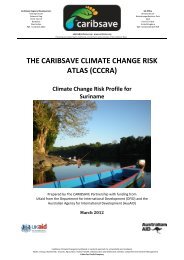You also want an ePaper? Increase the reach of your titles
YUMPU automatically turns print PDFs into web optimized ePapers that Google loves.
As outlined, managers will usually be interested in any investment that has pay-back times as short as 5-7<br />
years, while longer times are not favourable. While this would support investments into any technology<br />
with payback times of up to seven years, it means that alternative forms of financing are needed for some<br />
of the more expensive renewable energy technologies with longer payback periods. Most developing<br />
countries can look to use the Clean Development Mechanism (CDM) as an instrument to finance emission<br />
reductions. The CDM is one of the flexible instruments of the Kyoto Protocol with two objectives:<br />
1. to assist parties not included in Annex I in achieving sustainable development <strong>and</strong> in contributing to<br />
the ultimate objective of the convention of cost-efficient emission reductions;<br />
2. to assist parties included in Annex I in achieving compliance with their quantified emission<br />
limitation <strong>and</strong> reduction commitments.<br />
The CDM is the most important framework for the supply of carbon credits from emission reduction<br />
projects, such as electricity generation from biomass, renewable energy projects, or capture of CH4, which<br />
can be sold in the regulatory or the voluntary carbon markets. As such, it is a novel instrument to<br />
restructure isl<strong>and</strong>s towards low-carbon economies. As an Overseas Territory of the United Kingdom, <strong>Turks</strong><br />
<strong>and</strong> <strong>Caicos</strong> would be classified as an Annex I country <strong>and</strong> therefore ineligible to act as a host country for<br />
CDM. However, as indicated in Castalia (2011), there are other sources of international funding available. In<br />
particular the UK Government has carbon abatement targets, <strong>and</strong> pays money to comply with them; the<br />
Government of TCI should work with the UK Government to identify measures through which TCI can<br />
reduce carbon emissions <strong>and</strong> obtain funding. This would be in accordance with the commitments made in<br />
the 2001 Environment Charter (OTEP, n.d.).<br />
Further funds can be derived through voluntary payments by tourists. For instance, Dalton et al. (2008)<br />
found that 49% of Australian tourists were willing to pay extra for renewable energy systems, out of which<br />
92% were willing to pay a premium corresponding to 1–5% above their usual costs. In another study,<br />
Gössling <strong>and</strong> Schumacher (2010) found that 38.5% of a sample of international tourists in the Seychelles<br />
expressed willingness to pay for carbon-neutrality of their accommodation, out of which 48% stated they<br />
would be willing to pay a premium of at least €5 per night. While these values are not representative, they<br />
nevertheless indicate that there is considerable potential to involve tourists emotionally <strong>and</strong> financially in<br />
strategies to implement renewable energy schemes. The <strong>Turks</strong> <strong>and</strong> <strong>Caicos</strong> Isl<strong>and</strong>s already have an<br />
Accommodation Tax with 1% earmarked for environmental projects (Kairi Consultants Limited, 2000a). This<br />
could potentially be exp<strong>and</strong>ed to include investments in renewable <strong>and</strong> energy efficiency technologies.<br />
5.2.4. Summary<br />
The <strong>Turks</strong> <strong>and</strong> <strong>Caicos</strong> Isl<strong>and</strong>s are vulnerable to rising oil prices <strong>and</strong> global climate policy, particularly with a<br />
view to their rapidly growing tourism system. However, there are various tools that can be employed to<br />
reduce energy use in the country, possibly in the order of an estimated 20% within two years, though<br />
attention has to be paid to increasing tourist arrival numbers, which can outweigh achievements in<br />
efficiency gains. Adaptation should focus on policy, management <strong>and</strong> technology.<br />
Policy, including regulation, taxation <strong>and</strong> incentives, is important to increase pressure on<br />
stakeholders to engage with energy management – this is an area that is generally seen as less<br />
relevant <strong>and</strong> efforts to engage significant stakeholder numbers will dem<strong>and</strong> strong policy<br />
environments, as outlined in the Energy Conservation Policy <strong>and</strong> Implementation Strategy for the<br />
<strong>Turks</strong> <strong>and</strong> <strong>Caicos</strong> Isl<strong>and</strong>s.<br />
118





